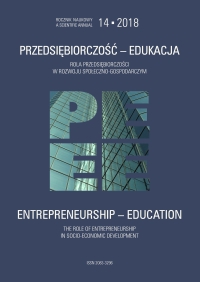Gry symulacyjne jako metoda rozwijania kompetencji przedsiębiorczych w szkołach średnich na przykładzie branżowych symulacji biznesowych
DOI:
https://doi.org/10.24917/20833296.14.33Słowa kluczowe:
gry symulacyjne, kompetencje przedsiębiorcze, nauczanie przedsiębiorczości, symulacje biznesoweAbstrakt
Celem artykułu jest ocena roli symulacji biznesowych w kształtowaniu kompetencji przedsiębiorczych w szkołach średnich. Autorzy definiują w nim pojęcia kompetencji przedsiębiorczych i gier symulacyjnych oraz dokonują klasyfikacji. W części empirycznej artykułu poddali analizie branżowe symulacje biznesowe pod kątem zawartości merytorycznej, zakresu podejmowanych decyzji, sposobu funkcjonowania, interakcji między uczestnikami, informacji zwrotnej dla uczestników, oceniania oraz roli nauczyciela w rozgrywce. Na podstawie przeprowadzonej analizy zweryfikowali, które kompetencje mogą być rozwijane dzięki wykorzystaniu tego narzędzia. Z wyciągniętych wniosków wynika, że symulacje biznesowe wspomagają kształtowanie takich kluczowych umiejętności i kompetencji, jak: inicjatywność i przedsiębiorczość, wyszukiwanie, selekcjonowanie i krytyczna analiza informacji, rozwiązywanie problemów, praca w zespole, myślenie matematyczne, kompetencje informatyczne, społeczne i obywatelskie. W wyniku przeprowadzonych analiz oraz na podstawie własnego doświadczenia w nauczaniu przedsiębiorczości z wykorzystaniem symulacji biznesowych autorzy opracowali zestaw rekomendacji dotyczących wykorzystania symulacji biznesowych w nauczaniu przedsiębiorczości na poziomie szkół ponadgimnazjalnych. Sugerują m.in. zwiększenie wymiaru godzinowego przedmiotu podstawy przedsiębiorczości, wprowadzenie profilowanych klas przedsiębiorczości oraz utworzenie konkursu najlepszych praktyk w zakresie edukacji przedsiębiorczości.Bibliografia
Armstrong, R.H.R., Hobson, M. (1974). “Where All Else Fails” – An Approach to Defining the Possible Uses of Gaming-simulation in the Decision-making Process. In: Simulation and Gaming.
Proceedings of the 12th Annual Symposium National Gaming Council and the 4th Annual Conference International Simulation and Gaming Association, 204–217.
Balcerak, A., Pełech, A. (2000). Pojęcia i definicje do nanomodelowania symulacyjnego. W: Symulacja systemów gospodarczych. Prace Szkoły Antałówka’99 – suplement. Warszawa: Wyższa Szkoła Przedsiębiorczości i Zarządzania i Politechnika Wrocławska, 9–23.
Balcerak, A. (2007). Rodzaje gier menedżerskich. O rubieżach klasyfikacji. W: Modelowanie symulacyjne systemów społecznych i gospodarczych II. Wrocław: Oficyna Wydawnicza Politechniki Wrocławskiej, 237–255.
Balcerak, A. (2008). Symulacyjne gry kierownicze. Wstęp. Wrocław.
Batko, M. (2016). Business Management Simulations – a detailed industry analysis as well as recommendations for the future. International Journal of Serious Games, 3(2), 47–65.
Finneran, A., Kwiatkowska-Ciotucha, D., Lichtarski, J., Stańczyk-Hugiet, E., Wąsowicz, M., Załuska, U. (2011). Diagnoza potrzeb w zakresie nauczania przedsiębiorczości. Raport. Wrocław: Uniwersytet Ekonomiczny we Wrocławiu.
Garrison, D.R., Kanuka, H. (2004). Blended learning: Uncovering its transformative potential in higher education. Internet and Higher Education, 7, 95–105. http://portal.bycprzedsiebiorczym.pl
Komisja Europejska. (2014). Kształcenie w zakresie przedsiębiorczości. Przewodnik dla osób kształcących. Bruksela.
Komisja Europejska. (2006). Realizacja wspólnotowego programu lizbońskiego: Rozbudzanie ducha przedsiębiorczości poprzez edukację i kształcenie. Komunikat Komisji dla Rady, Parlamentu Europejskiego, Europejskiego Komitetu Ekonomiczno-Społecznego i Komitetu Regionów. Bruksela, COM(2006)33/F.
Korbut, M. (1999). Metody symulacyjne – gry decyzyjne w kształceniu doradców zawodowych i pośredników pracy. W: W. Rachalska (red.), Poradnictwo zawodowe w wymiarze europejskim. Częstochowa: WSP.
Krzyżek, J. (2010). Narzędzia wykorzystywane do tworzenia pomocy dydaktycznych wspomagających e-learning w szkole. E-mentor, 1(33), 30–33.
Łodyga, O. (2013). Multimedia w nauczaniu przedsiębiorczości. W: L. Bachanowski (red.). Postępy e-edukacji. Warszawa: Wydawnictwo PJWSTK, 93–101. Pozyskano z: https://repin.pjwstk.edu.pl/ xmlui/bitstream/handle/186319/201/rozdzial_5.pdf?sequence=1
Mitchelmore, S., Rowley, J. (2010). Entrepreneurial competencies: a literature review and development agenda. International Journal of Entrepreneurial Behaviour & Research, 16(2), 92–111.
Metera, A., Pańków, J., Wach, T. (1983). Teoretyczne i metodyczne zagadnienia symulacyjnych gier kierowniczych. Warszawa: Instytut Organizacji i Doskonalenia Kadr.
Okoń, W. (1998). Wprowadzenie do dydaktyki ogólnej. Warszawa: Wydawnictwo „Żak”.
Piróg, D. (2015). Kompetencje z zakresu przedsiębiorczości: rozważania teoretyczne i ich ilustracje w obszarze szkolnictwa wyższego. Przedsiębiorczość – Edukacja, 11, 364–376.
Prensky, M. (2001). Digital Game-Based Learning, McGraw Hill Companies, New York.
Słownik języka polskiego PWN, http://www.sjp.pwn.pl.
Świtalski, W. (1977). Gry symulacyjne. W: Zastosowanie metod symulacyjnych w przemyśle chemicznym. Warszawa: PTE, 127–146.
Walkowiak, M. (1981). Symulacyjne gry decyzyjne – porównanie wybranych definicji. W: Symulacja Systemów Gospodarczych – Trzebieszowice’81. Wrocław–Gliwice: TNOIK i Instytut Ekonomiki Przemysłu Chemicznego, 203–209.
Pobrania
Opublikowane
Jak cytować
Numer
Dział
Licencja
Artykuły publikowane są zgodnie z warunkami licencji Creative Commons (CC BY-ND 4.0; uznanie autorstwa-bez utworów zależnych).

